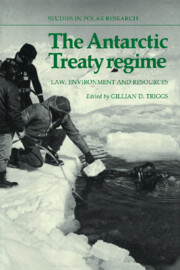Book contents
- Frontmatter
- Contents
- List of contributors
- List of Antarctic Treaty Parties
- Foreword
- Introduction
- Frontispiece: Map of national claims
- Part I Antarctica: physical environment and scientific research
- 1 Introduction
- 2 The Antarctic physical environment
- 3 Scientific opportunities in the Antarctic
- Part II The Antarctic Treaty regime: legal issues
- Part III The Antarctic Treaty regime: protecting the marine environment
- Part IV The Antarctic Treaty regime: minerals regulation
- Part V Whither Antarctica? Future policies
- Part VI Conclusion
- Selected reading
- Appendix 1
- Appendix 2
3 - Scientific opportunities in the Antarctic
Published online by Cambridge University Press: 20 January 2010
- Frontmatter
- Contents
- List of contributors
- List of Antarctic Treaty Parties
- Foreword
- Introduction
- Frontispiece: Map of national claims
- Part I Antarctica: physical environment and scientific research
- 1 Introduction
- 2 The Antarctic physical environment
- 3 Scientific opportunities in the Antarctic
- Part II The Antarctic Treaty regime: legal issues
- Part III The Antarctic Treaty regime: protecting the marine environment
- Part IV The Antarctic Treaty regime: minerals regulation
- Part V Whither Antarctica? Future policies
- Part VI Conclusion
- Selected reading
- Appendix 1
- Appendix 2
Summary
Introduction
Although it is so remote, the Antarctic is a significant region amounting to nearly a tenth of the land surface of our planet and a tenth of the world's ocean. Formerly the keystone of the southern supercontinent Gondwana, it is now isolated from the other continents by a wide deep ocean, and all but 1% of the land surface is covered by ice, over 4 km deep in places, a result of its polar position, which makes it the highest and coldest continent. The relative positions of the south geographic and geomagnetic poles have implications for geophysical studies. It has importance for meteorological and climatic studies, having a world-wide influence due to the fact that it is the strongest cooling centre of the global system. Being without an indigenous human population, Antarctica is still relatively unaffected by human activities. As such it can serve as a baseline for studies on global pollution of various kinds and the clear atmosphere confers advantages for certain research. A range of biological problems can be studied better there than anywhere else. A further advantage is the unique political situation and the absence of national boundaries under the Antarctic Treaty which allows large-scale international cooperation in science. However, because of the high costs of supporting research in such a remote and rigorous environment, there need to be very good reasons for conducting research there, rather than elsewhere. At the same time, the dependence of scientists on a common provision of logistic support tends to encourage interdisciplinary programmes.
- Type
- Chapter
- Information
- The Antarctic Treaty RegimeLaw, Environment and Resources, pp. 28 - 48Publisher: Cambridge University PressPrint publication year: 1987
- 1
- Cited by

